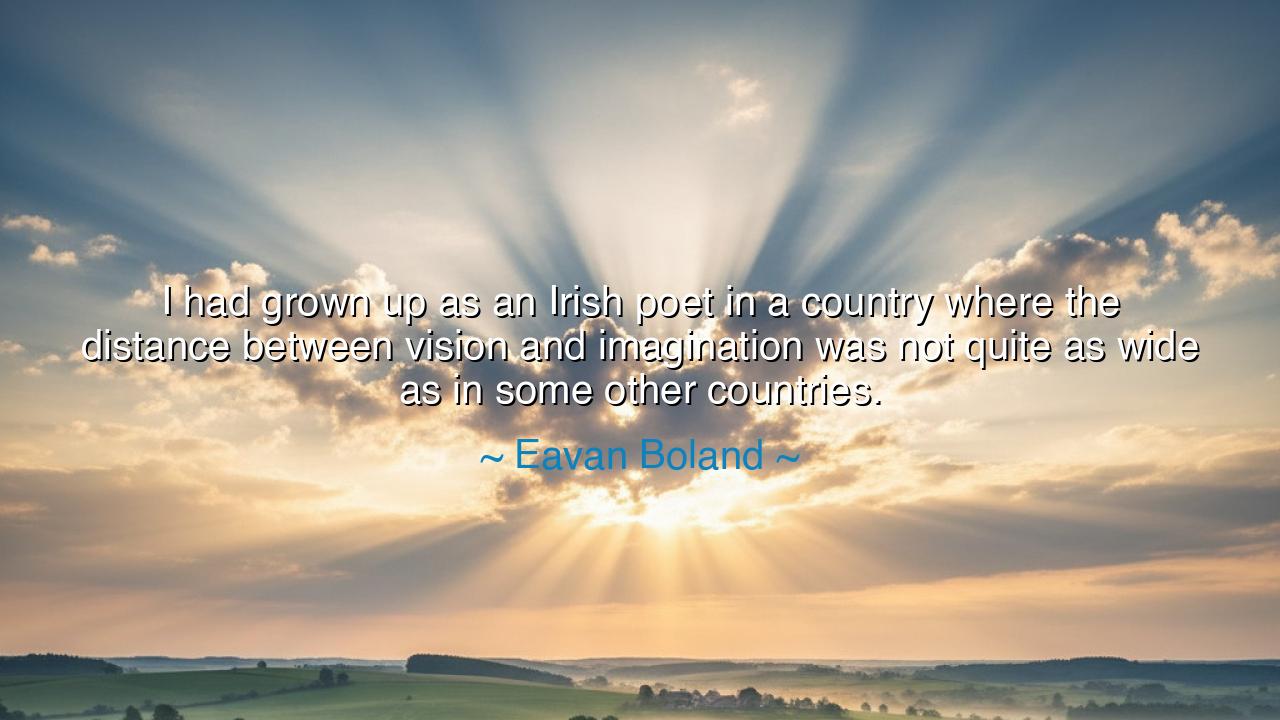
I had grown up as an Irish poet in a country where the distance
I had grown up as an Irish poet in a country where the distance between vision and imagination was not quite as wide as in some other countries.






“I had grown up as an Irish poet in a country where the distance between vision and imagination was not quite as wide as in some other countries.” Thus spoke Eavan Boland, one of Ireland’s great voices — a poet who carried in her heart both the sorrow and the splendor of her land. Her words rise not as mere remembrance, but as revelation: they speak of a people for whom vision and imagination are intertwined like roots of the same ancient tree. In this saying, Boland recalls not only her own awakening as an artist, but the character of an entire nation — a place where the boundaries between dream and truth, myth and memory, are as faint as mist upon the hills.
In Ireland, the poet has always been more than a maker of verses; they have been the guardian of the soul’s fire. The Irish tongue was forged in struggle and song, in faith and defiance. There, vision — the power to perceive what lies beyond the visible — and imagination — the power to give it form — have never stood apart. The land itself, ancient and storied, invites such union. The rivers whisper legends, the stones remember saints, and the wind carries voices of both the living and the dead. To be born into that world is to be born into the language of enchantment.
Eavan Boland, as a woman and a poet, felt this deeply. She saw that in Ireland, even the ordinary was laced with myth — a field might still hold the shadow of a goddess, a village might recall the echo of a hero’s fall. Her poetry sought to bridge the vision of Ireland’s past with the imagination of its present, weaving myth into modern life, so that the ancient and the everyday might speak once more. In her lines, the mother becomes a muse, the kitchen a kingdom, and history a living breath. She understood that in her homeland, imagination did not simply invent; it remembered.
This closeness between vision and imagination can be seen throughout Irish history. Consider the figure of William Butler Yeats, who dreamed of a mystical Ireland where gods and peasants walked the same earth. For him, vision was not escape but revelation — a means to grasp the divine pattern behind the mundane. His imagination gave shape to that vision, summoning spirits and heroes from the fog of time, and through his verse, Ireland found its reflection as both myth and nation. Yeats and Boland, though of different centuries, drank from the same well: the deep, ancient sense that poetry is both the seeing and the shaping of truth.
In many lands, vision and imagination have drifted apart — the one claimed by mystics and dreamers, the other by artists and artisans. But in Ireland, as Boland reminds us, they are kin. The vision gives birth to feeling, and the imagination clothes it in words. One cannot exist without the other. It is a bond forged by centuries of storytelling, by the hardship of exile and the strength of memory. The Irish, long bound to silence by oppression, learned to speak through song and myth — and in doing so, blurred the border between dreaming and being.
Boland’s reflection also bears a challenge for us all: to live in a way that closes the gap between what we see and what we envision. Too often, the world teaches us to separate our imagination from our daily lives — to relegate wonder to childhood, and vision to the impossible. But the poet’s path teaches otherwise. When we allow imagination to enter our vision of the world, our lives become richer, truer, more awake. We begin to see the sacred in the simple, the eternal in the moment, the infinite in the familiar.
Thus, take this as your lesson: do not let your vision drift into abstraction, nor your imagination into idle fancy. Let them meet, as they did in the poets of Ireland. See the world not only as it is, but as it could be — and then give that vision form through word, deed, or creation. Cultivate your inner seer and your inner maker, for both are needed to shape beauty and truth.
In the end, Boland’s words remind us that the distance between vision and imagination is not fixed — it can be bridged by the heart. And when the two walk together, as they once did on the green hills of Ireland, the world itself becomes poetry — a living testament that what we dream can indeed be made real.






AAdministratorAdministrator
Welcome, honored guests. Please leave a comment, we will respond soon